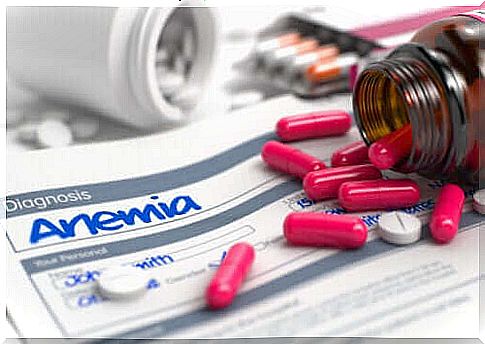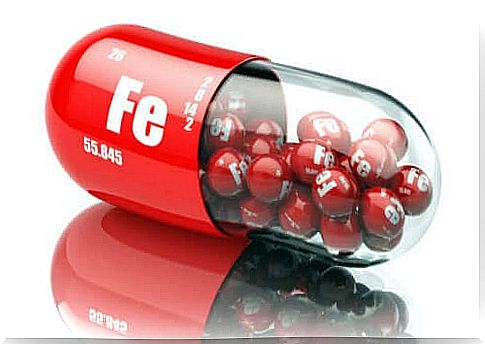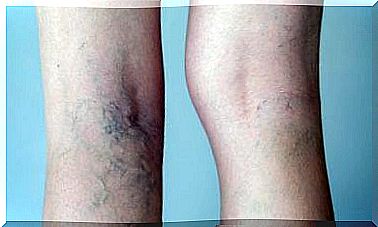When Should I Take An Iron Supplement?

enough iron in your diet
Iron is essential for hemoglobin production as well as red blood cell formation. Therefore, iron deficiency can predispose to complications.
Causes of iron deficiency
It is difficult for the body to carry oxygen to the tissues when iron levels are low. Therefore, the most common symptoms of iron deficiency are fatigue, weakness, headache, pallor, and cold hands and feet. These symptoms may indicate anemia.
Note that the body’s ability to work and motor activity decreases as a result of iron deficiency. All of this affects the immune system and thus increases the risk of disease. Low levels of this mineral also have an effect on the metabolism of vitamin A in the liver.

When should an iron supplement be taken?
Fortunately, iron supplements prevent and help treat these complications. They need to be part of a comprehensive and balanced diet to get good results.
According to several studies, some populations have an increased need for this mineral. It can be the result of poor diet or anemia-related human life stages such as:
Pregnancy
Pregnant women need more iron than normal for themselves and their baby. The risk of anemia increases during pregnancy if iron levels are low. The risk also increases if the baby has a low birth weight or is born prematurely, or if the red blood cell count is low from birth.
The World Health Organization says as many as 40 percent of pregnant women have anemia. This may suggest that even half of the population has low iron values.
Therefore, pregnant and lactating women should discuss with their doctor the ideal diet and supplements to prevent this problem. Doctors may prescribe an iron supplement in tablet or liquid form. In severe cases, it is also possible to inject iron, especially in cases where the pregnant woman is experiencing uncontrolled vomiting.
Babies and toddlers
Iron deficiency can cause retardation in psychological development as well as social isolation and impaired concentration. Infants can also develop this deficiency condition if the mother does not include enough foods that contain iron in her diet.
Women of childbearing potential and adolescents
Women of childbearing potential are more prone to iron deficiency. In general, this is due to heavy menstruation.
Adolescent girls also have an increased need for iron due to their development, which is exacerbated by heavy menstruation. The most common cause of anemia in young women is intermittent bleeding, or metrorrhagia.
Regular blood donors
These individuals are susceptible to low iron levels, but may prevent it if they adhere to the recommended interval between donations.
Anemia due to chronic disease
According to several studies, chronic diseases such as rheumatoid arthritis, irritable bowel syndrome, gastrointestinal disorders, and certain types of cancer can interfere with the body’s ability to use iron as well as its absorption. Therefore, patients suffering from the above diseases usually also suffer from low iron levels.
What should be considered when taking an iron supplement?
Iron supplements are available as tablets, capsules and liquids. Ferrous sulfate is the most common, but there are other chemical forms such as gluconate and fumarate.
It is important to remember that these are good to take on an empty stomach for absorption. On the other hand, ingestion of iron supplements can lead to abdominal cramps, nausea and diarrhea. It is best to eat a small amount of food at the same time to avoid these problems.
In addition, calcium and antacids can interfere with iron absorption, so it’s a good idea to wait a few hours before consuming dairy products, raw vegetables, caffeine, or other medications. On the other hand, foods high in vitamin C, such as citrus fruits and kiwi, can promote iron absorption.
Regular blood tests are recommended to assess iron deficiency. This method determines the exact number of red blood cells as well as the hemoglobin value. It is also possible to measure the levels of iron and its transport proteins in the blood if it is deemed necessary.

Should you take an iron supplement?
Iron supplements are an effective way to increase iron stores in the body, but they are not suitable for everyone. Keep in mind that consuming supplements without a doctor’s prescription is never worth it, as excess or unsuitability can lead to complications.
It is best to follow a good, balanced diet with foods high in iron. Remember that supplements are not a magic cure and should not be the only strategy against iron deficiency. Similarly, a decrease in red blood cells does not always mean iron deficiency.









